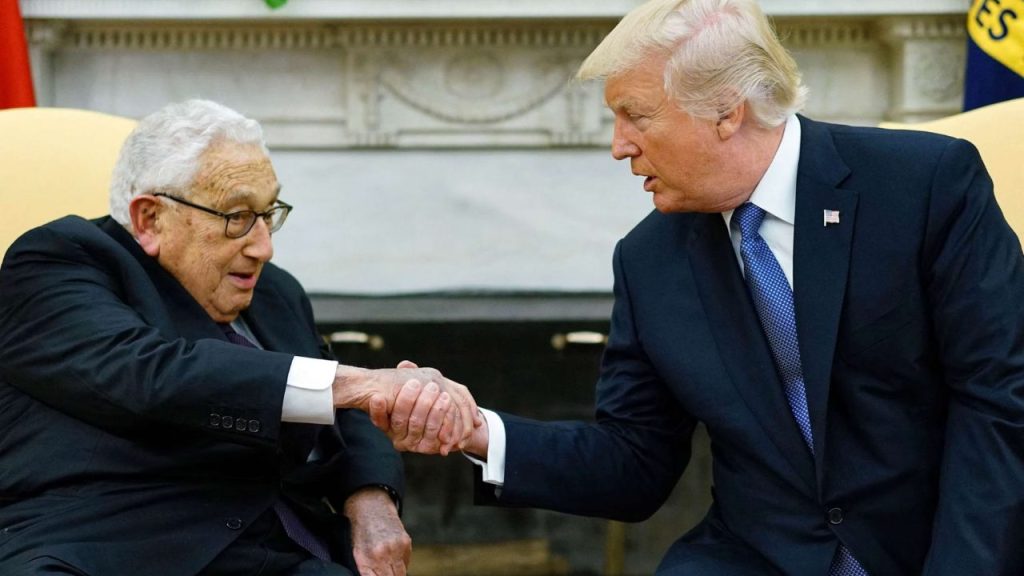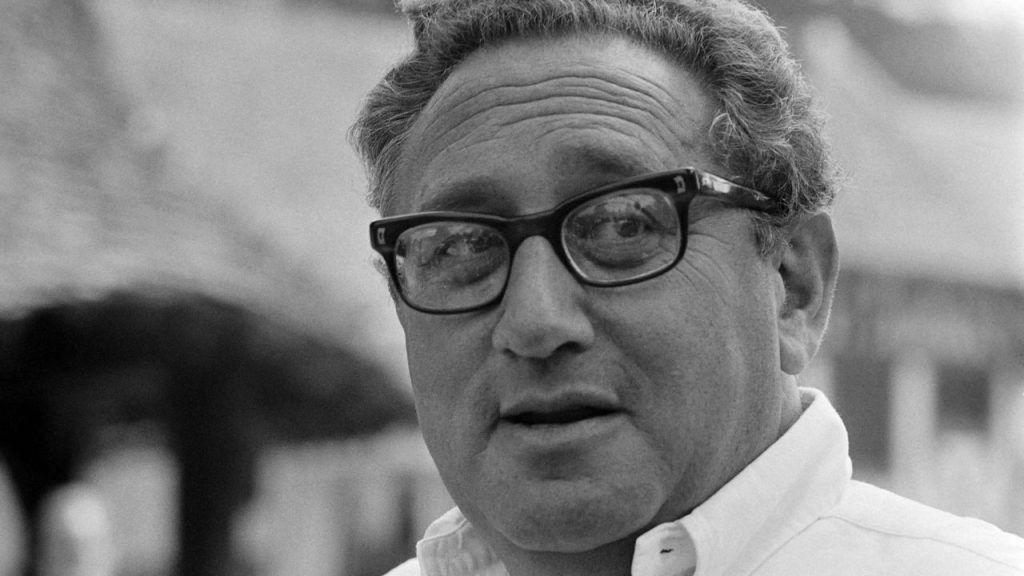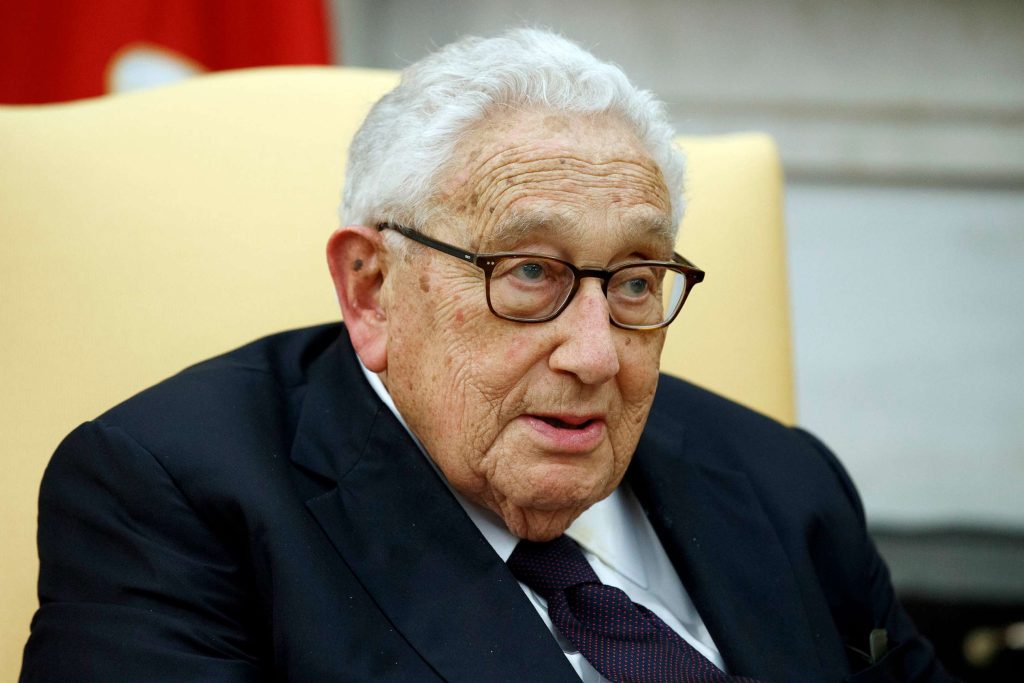Henry Kissinger, the influential and controversial figure in U.S. foreign policy during the Nixon and Ford administrations, passed away at 100, as confirmed by his consulting company on Wednesday night.
In a statement, Kissinger Associates, Inc. announced the death of Dr. Henry Kissinger, describing him as a respected American scholar and statesman who died at his Connecticut home. The statement mentioned that a private family service will be held for his interment, with a memorial service scheduled for a later date in New York City.
Kissinger remained politically active despite leaving office, assuming a respected elder role for Republicans and Democrats. Over the years, he continued to engage with political figures, such as meeting with Sarah Palin in 2008 and having phone conversations with Mitt Romney during the 2012 campaign. Kissinger also discussed with Donald Trump shortly after the 2016 presidential election and in the White House in 2017.
Hillary Clinton, who contested against Trump in 2016, expressed her condolences, referring to Kissinger as a friend and acknowledging that she had relied on his counsel during her tenure as secretary of state from 2009 to 2013.


Early years
Born as Heinz Kissinger in Fuerth, Germany, on May 27, 1923, the former secretary of state’s parents, Louis and Paula Kissinger, fled Nazi Germany, seeking refuge in the United States in 1938. In his new homeland, the son of a German Jewish schoolteacher excelled in his academic pursuits.
Enlisting in the U.S. Army in 1943, Kissinger, stationed in South Carolina at age 20, became a naturalized U.S. citizen. Serving in combat with the 84th Infantry Division, he volunteered for intelligence duties during the Battle of the Bulge.
Kissinger reflected on his time in the Army, saying, “It was an Americanization process… It was the first time I was not with the German Jewish people; I gained confidence in the Army.”
He earned his BA in political science from Harvard University in 1951 and obtained his MA and PhD degrees from the same institution.
Recruited by the Council on Foreign Relations in 1955, Kissinger led a study group examining the implications of Secretary of State John Foster Dulles’s “massive retaliation” strategy in the U.S. Cold War approach against the Soviet Union. Criticizing the strategy, which threatened nuclear destruction for minor infractions, Kissinger published his report “Nuclear Weapons and Foreign Policy” in 1957—a surprising best-seller.
Subsequently, Kissinger served as a consultant to various government agencies and think tanks, including the Operations Research Office, the Arms Control and Disarmament Agency, the State Department, and the RAND Corporation. In January 1969, he was appointed as Nixon’s national security adviser.


Key role in US foreign policy
Serving as the national security adviser from 1969 to 1975 and later as secretary of state from 1973 to 1977 during the administrations of Presidents Richard Nixon and Gerald Ford, Henry Kissinger played a pivotal role in shaping key diplomatic initiatives. Under his guidance, groundbreaking efforts like détente (the relaxation of strained relations) with the Soviet Union and the Strategic Arms Limitations Talks (SALT) were pursued.
The SALT negotiations, initiated in 1969 under Nixon, resulted in two treaties signed by the United States and the Soviet Union in 1972 and 1979. These treaties limited the number of long-range ballistic missiles each country could possess and manufacture.
Kissinger also spearheaded diplomatic efforts to establish relations with China, culminating in the historic state visit between Nixon and Chinese leader Zhou Enlai in 1972. The resulting Shanghai Communique outlined guidelines for normalizing relations between the two nations.
Instrumental in bringing an end to the Vietnam War, Kissinger’s approach faced criticism for secret bombings of Cambodia and Hanoi and a ground invasion of Cambodia in 1970. Some argued that these actions prolonged the conflict and led to unnecessary loss of life.
Despite the controversy, Kissinger’s secret meetings with North Vietnamese leader Le Duc Tho in Paris eventually led to a brief truce. Though Tho declined the award, they earned both leaders the 1973 Nobel Peace Prize.
In 1975, more than two years after the Peace Prize, North Vietnamese forces conquered South Vietnam, effectively concluding the conflict. A Pentagon report from 1973 revealed Kissinger’s approval of thousands of Cambodia bombing raids in 1969 and 1970, conducted covertly to avoid public awareness.
The “Operation Menu” bombing campaign, which dropped over 2 million tons of bombs, resulted in a significant number of civilian casualties. Critics, both then and now, attribute blame to the Nixon administration and Kissinger for the Khmer Rouge’s subsequent invasion of Cambodia in 1975, asserting that U.S. policies hastened the rise of the communist regime.
In testimony to Congress in 1975, Kissinger acknowledged a disregard for Cambodia’s well-being during U.S. operations, stating that the focus was primarily on Vietnam-related goals. He admitted, “Our guilty responsibility toward the Cambodians is that we conducted our operations in Cambodia primarily to serve our purposes related to Vietnam, and they have now been left in a very difficult circumstance.” Despite the admission, Kissinger later contended that without U.S. intervention, the communists would have taken over Cambodia much earlier.
Legacy under scrutiny
As he neared the end of his life, the demand for Henry Kissinger to testify and be held accountable for his decisions during his time in office became increasingly pronounced.
In 2001, British journalist Christopher Hitchens authored “The Trial of Henry Kissinger,” alleging that Kissinger had authorized brutal actions by politicians allied with the United States, leading to the deaths of thousands of innocent civilians. By 2002, scrutiny of Kissinger’s past activities in Latin America during his tenure in office appeared poised to tarnish, if not completely mar, his reputation.
Also Read India to Increase Imports of Coking Coal from Russia – Insider Reports
Summonses had been issued in five countries by then, seeking information about Kissinger’s involvement in Operation Condor—a purported conspiracy involving murder, torture, and kidnappings orchestrated by Latin American dictators in the 1970s spanning Chile, Argentina, Paraguay, Brazil, Bolivia, and Uruguay. As President Nixon’s national security advisor, Kissinger was strongly suspected of possessing comprehensive knowledge of the operation.
The controversy resurfaced in 2010 when a cable, dated September 16, 1976, was declassified and made public by various news outlets. In the cable, Kissinger appeared to reject the delivery of a proposed warning to Uruguay’s government regarding Condor operations. He explicitly ordered “no further action be taken on this matter” by the State Department, as the Los Angeles Times reported.


However, Kissinger promptly asserted, following the release of the cable, that its interpretation had been “distorted.” He clarified that its intended purpose was solely to express disapproval of a specific approach to the Uruguayan government, not to negate the overall plan to issue warnings to other nations suspected of participating in the Condor network, as reported by the LA Times.
In a July 2022 interview with ABC News’ George Stephanopoulos, Kissinger addressed the controversy surrounding his tenure.
“Nixon and I, we had a tendency; we were not proponents of escalation. However, if we deemed escalation necessary, our approach was to escalate to a point closely aligned with what the other side would tolerate. This was to prevent the risk of sliding into a nuclear war through a series of incremental steps. As it turns out, the last of these steps could be nuclear.”
Kissinger responded, When asked about any policy decisions he might reconsider in the interview, “I haven’t come up with a definitive answer for that. I’ve been grappling with these issues throughout my life. It’s my hobby… it’s my profession. My recommendations were the best I could formulate at that time.”
Life after government
Upon exiting government service in 1977, Kissinger founded a consulting firm, Kissinger Associates, where he commanded substantial fees as a speaker. He continued to contribute as a member of various presidential commissions, maintained a presence in the media by writing newspaper columns, and shared his perspectives on television. In 1994, Kissinger assumed a consultancy role for the boards of MGM and Credit Lyonnais.
Beyond receiving the Nobel Peace Prize, Kissinger was honored with the Presidential Medal of Freedom in 1977 and the Woodrow Wilson Award for Public Service in 2006. In 1995, Queen Elizabeth II appointed him an Honorary Knight Commander in the Most Distinguished Order of St. Michael and St. George.
Reflecting on his life and career, Kissinger told Stephanopoulos, “When I was around 15 in Germany, it never crossed my mind that someday I might become the secretary of state of the United States and be in a position to contribute. It’s an incredible testament to America that such possibilities exist… I belonged to a discriminated minority, so strategic career planning was not a feasible concept.”
“It was an extraordinary destiny—and hence a responsibility—to give my best to the challenges at hand,” he added.
Kissinger is survived by his wife, Nancy Maginnes Kissinger, and his children, Elizabeth and David, from a previous marriage.

